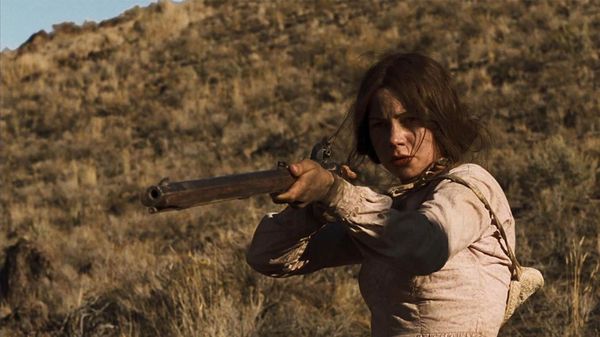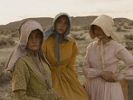Eye For Film >> Movies >> Meek's Cutoff (2010) Film Review
Meek's Cutoff
Reviewed by: Owen Van Spall

A kind of anti-western, while still owing a debt to the genre and, in particular, to films such as Terrence Malick's Days Of Heaven, Meek's Cutoff is an intriguing and beautiful but ultimately somewhat cold film. Coming from director Kelly Reichardt, who directed the award-winning Old Joy and critics' favourite Wendy And Lucy, it shares the same minimalist touch that she has become known for and reunites her both with actor Michelle Williams and with the American state of Oregon. It is a film that is breathtaking to look at, but could have done with an infusion of some of the verve and energy the Western genre is known for.
Meek's Cutoff is set in 1845, during the early days of the forging of the West by bands of 19th century immigrants, who snaked over the still-wild lands of the USA. A wagon train of three Christian families has hired the unkempt, grizzled explorer Stephen Meek (Bruce Greenwood) to guide them over the Cascade Mountains. Meek claims to know the land well and promises them a shortcut. But as the group grinds on for weeks with food and water dwindling, they begin to suspect he is lost in the wilderness.

Their attempts to challenge Meek are thrown into confusion, however, when they stumble across a lone native American (Rod Rondeaux), who may or may not be able to lead them to water. Meek lambasts the travellers with stories of the Indian's savagery, promising that he will betray them. But the more outspoken of the young wives, Emily Tetherow (Michelle Williams), isn't so sure. A clash of wills looms.
There is a fable-like quality to this film's construction, with plenty of lengthy shots of vast, parched plains and jagged hills and ridges that might as well be from another planet. Beyond the native American, the travellers encounter not another soul, it is literally as if they have disappeared off the edge of the world to a place where space and time take on whole new meanings. The territory they are in is a land without law or recognisable landmarks, where a man like Meek is free to boast of unverifiable tales of battling bears and encountering the victims of bizarre Indian rituals. One could also read any number of allegories of our modern times into this tale – is it a critique of blind faith, of how political leaders (ie men) lead their followers astray, or of how cruelly and superstitiously we treat and regard “the others”?
Along with her eye for composition, Reichardt also deserves praise for the focus on the smaller period details - be it a child reading a bible over and over again, the painfully plain clothes the travellers wear, to the clear social divide between the men and women (the women are always, seemingly, walking behind the men or gathering off to one side while their husbands make all the decisions). This helps give the characters colour in the absence of much dialogue - there are absurdly long stretches of near-silence in this film often punctured only by the squeak of a wagon wheel - and wraps us tighter into their fate.
The glacial pacing, desolate atmosphere and pared-down dialogue will doubtless put many off Meek's Cutoff. There is a great deal of tension that the film takes its time to build without ever seeming to really release or direct it - this a film short on answers and resolutions. But Reichardt has undeniably crafted a very ambitious and bold take on the Western and helped ensure that this genre, which has enjoyed yet another renaissance in recent years, will continue to be mined and reinterpreted.
Reviewed on: 08 Feb 2011
















